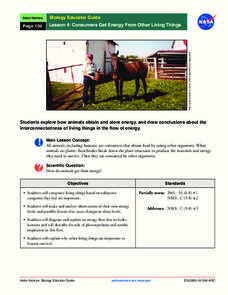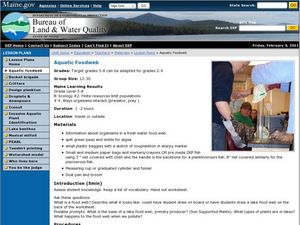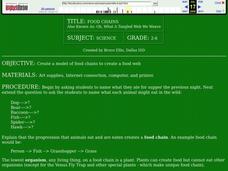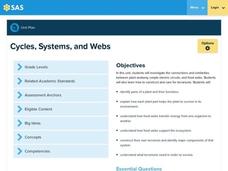NASA
Consumers Get Energy From Other Living Things
How do plants and animals get their food? Learn about where energy comes from, how animals store energy, and aerobic respiration, in a lesson that allows scholars to diagram energy flows.
Curated OER
Aquatic Foodweb
Students explore what a food web is. In this science lesson, students examine how nutrients and other pollutants enter a lake and play a food web game whereby students pretend they are either zooplankton, planktivore, piscivore, or...
Curated OER
Blue Planet: Open Ocean
Students research facts about animal species. In this ocean instructional activity students view a video, prepare illustrated cards and create a food-web display.
Curated OER
Organisms and Their Environment
Learners observe elements of a local ecosystem and gain an understanding of what elements make up an ecosystem. In this ecosystem lesson students create a class food web that shows the interactions among the elements of the ecosystem.
Curated OER
Fish Are Animals Too
Students create posters that show how a shark is a major predator in kelp forests and coral reefs after studying the food webs for these ecosystems. They determine that fish are important animals in the ocean's web of life.
Curated OER
How do pollutants bioaccumulate and biomagnify?
Students review the basic concepts of the food chain. In small groups, they research an organism and create a food web. In addition, they study biomagnifications and write a brief essay or make a poster informing others about the...
Curated OER
The Circle of Life: Food Chain
Students develop a flow chart using computer software to show a food chain combination. In this food chain lesson, students are first read The Great Kapok Tree by Lynne Cherry, then they create a story map of the story. Next, students...
Curated OER
Food Chains
Fourth graders study food chains, producers, consumers, and decomposers. They play a food chain game and create food chain mobiles or posters. They take a nature hike around the school and observe various parts of a food chain.
Curated OER
Food Chain
Third graders explore why food chains are important. In this food chain instructional activity, 3rd graders break into small groups to represent parts of the food chain. Different amounts of food are given to each group and any spilled...
Curated OER
In the Wild
Third graders examine the concept of ecology and how animals are suited to their habitats. In this animal adaptation lesson, 3rd graders identify a variety of plants and animal species that live in a Beech forest.Students create a food...
Curated OER
Pond Ecology
A lab activity is a great way to incite thoughtful questioning and scientific processes. Pupils will collect organisms with a Petri dish, make observations, sketch the organism, ask questions, then attempt to identify the specimen...
Curated OER
Go To Sleep, Gecko!
Second graders examine the interdependence of organisms using the book "Go To Sleep, Gecko!" They examine a variety of food chains, listen to the book, and answer story comprehension questions. Students then conduct research on food...
Curated OER
I Can Eat A Rainbow!
In this planning a healthy meal worksheet, students use a color guide with symbols to color a plate to designate the food groups, use it to plan a healthy balanced meal, and rate their plate. Students complete 15 activities and answers.
Pennsylvania Department of Education
Cycles, Systems, and Webs
Fourth graders review the parts of the plant and their functions. In this plant lesson plan, 4th graders recognize that plants must transfer energy to make food. Students understand the interdependence of organisms in an ecosystem.
Curated OER
Introduction to the Food Pyramid
Students review information on the food pyramid, either in printed works or on the Internet, to research healthy eating habits.
Curated OER
Charlotte's Web
Fourth graders focus on fluency by reading the book Charlotte's Web. For this reading strategies lesson, 4th graders partner read, do guided reading, and independent reading to increase fluency. Students use Venn Diagrams, discuss cause...
NOAA
An Ocean of Energy
Young biologists trace the path of the sun's energy through marine ecosystems in the second part of this four-lesson plan series. Building on prior knowledge about producers, consumers, and decomposers students are introduced to the...
Curated OER
Water is Life
Krill is a very small ocean animal that is key to keeping the ocean ecosystem going. The class reviews food webs and chains, learns about the importance of krill, discusses krill anatomy, builds a model of a krill, and then has a...
NASA
Producers Make Their Own Food
During an inquiry-based lesson, scholars decide which variable to test and then design an experiment to determine the needs of producers. After two weeks, they complete a full analysis and research paper.
Curated OER
Through the Eyes of an Owl
Students describe vertebrates in terms of observable body parts and characteristics and describe life cycles of familiar organisms. They identify familiar organisms as part of a food chain or food web and describe their feeding...
University of California
Energy and Biomass Pyramids
Young scientists play tag as they act out the food pyramid in the ocean ecosystem. Energy circles pass from the smaller prey to the predators and at the end of the activity, a data chart and analysis questions allow pupils to apply their...
Howard Hughes Medical Institute
Lesson 5: Tracking Lion Communities
Researchers in Gorongosa National Park placed cameras there many years ago to understand what was happening with the lion communities that lived there. Little did they know, they opened a door to so much more! Inquisitive...
NOAA
Deep-Sea Ecosystems – Life is Weird!
A pool of brine in the deep sea can be up to four times as salty as the surrounding sea water. The deep sea ecosystem relies on chemosynthesis and the organisms that live there are often strange to us. The lesson focuses on researching...

























